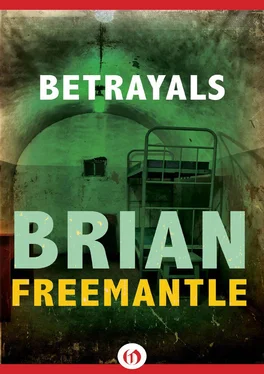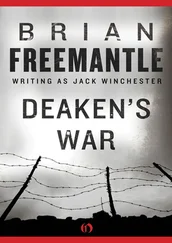Brian Freemantle - Betrayals
Здесь есть возможность читать онлайн «Brian Freemantle - Betrayals» весь текст электронной книги совершенно бесплатно (целиком полную версию без сокращений). В некоторых случаях можно слушать аудио, скачать через торрент в формате fb2 и присутствует краткое содержание. Жанр: Триллер, на английском языке. Описание произведения, (предисловие) а так же отзывы посетителей доступны на портале библиотеки ЛибКат.
- Название:Betrayals
- Автор:
- Жанр:
- Год:неизвестен
- ISBN:нет данных
- Рейтинг книги:5 / 5. Голосов: 1
-
Избранное:Добавить в избранное
- Отзывы:
-
Ваша оценка:
- 100
- 1
- 2
- 3
- 4
- 5
Betrayals: краткое содержание, описание и аннотация
Предлагаем к чтению аннотацию, описание, краткое содержание или предисловие (зависит от того, что написал сам автор книги «Betrayals»). Если вы не нашли необходимую информацию о книге — напишите в комментариях, мы постараемся отыскать её.
Betrayals — читать онлайн бесплатно полную книгу (весь текст) целиком
Ниже представлен текст книги, разбитый по страницам. Система сохранения места последней прочитанной страницы, позволяет с удобством читать онлайн бесплатно книгу «Betrayals», без необходимости каждый раз заново искать на чём Вы остановились. Поставьте закладку, и сможете в любой момент перейти на страницу, на которой закончили чтение.
Интервал:
Закладка:
Confidently alone in the apartment, she said: “Don’t think badly, darling. It’s just that I feel so very alone.”
Once-a-week meetings became twice a week, and when the weather got better he took her to the yacht basin on the Alexandria side of the Potomac and they went sailing in his boat, which was not white fiberglass and gleaming chrome like most of the others, but fat-bellied and clinker-built, in wood. Sheridan sailed as he appeared to do everything else, with quiet, undemonstrative competence. That first time Janet was uncertain, because sailing had never been something she did, but with Sheridan she immediately felt safe. They started sailing every weekend, he the patient instructor, Janet the eager student. She was apprehensive again when he suggested going away for an entire weekend, casting off on Saturday and tying up overnight somewhere on the Chesapeake Bay: he kissed her differently now but had not suggested-or attempted to do-anything more and Janet was unsure how she would feel if he did. Yet again her fears were unfounded. There was only one cabin, the bunks on either side and when she went below she saw there were single sleeping bags laid out on each. That night, without any discussion, he let her go in first to undress and get into bed before he followed.
The season was right, and so one Sunday Sheridan took her to a crab feast in a weathered, unprepossessing wooden restaurant, where the waitress tore brown paper from a roll to form a tablecloth and Sheridan warned her they were expected to eat with their fingers. They drank beer from a pitcher and Sheridan taught her how to dismember the small crabs. Her fingers and face became sticky from the flavoring salt and Janet realized, surprised, that she was thinking of nothing beyond what she was doing and the person with whom she was doing it. She couldn’t remember being so happy for a very long time.
Afterwards, after the disaster, when she reflected upon everything that had happened between them, Janet calculated that to be the precise moment she had fallen in love with John Sheridan, although of course that was not her awareness then.
It was a month after the crab feast that they made love. It was a Friday night and they had been out to the Virginia restaurant to which he had taken her on their first date. Afterwards he’d come up to the apartment for brandy, which had become the custom. He had one drink, which was all he ever allowed himself and then he said: “I suppose I should be going?” posing it as a question, which he never had before.
“I suppose you should,” Janet said, making it sound like a question too, not knowing whether she had intended it that way or not.
Sheridan remained sitting across from her, gazing at her, and Janet held his eyes, unmoving as well. Sheridan said: “I don’t want to.”
“No,” said Janet, as if she were agreeing to something they had already discussed. She waited for the nervousness that she expected but nothing came.
She tried not to be so stiff and awkward, embarrassed at herself, but he was gentle and kind, coaxing her to relax. And eventually she did relax although not, on that first occasion, as much as she was able to later. Sheridan was as competent as a lover as he appeared to be about everything else, despite her tenseness bringing her to a climax as he climaxed himself and then slowly leading her down from the peak of her excitement. They lay entwined for a long time afterwards, unspeaking, Sheridan soothing his hand along her face.
Eventually he said: “I don’t want this to spoil how it was before with us.”
“It won’t.”
“You sure?”
Janet wasn’t, not then. “I don’t think so.”
“Sorry?”
“I don’t know,” she answered honestly. “Not yet.”
Janet soon became sure.
There were nights when they did not see each other, but increasingly few. It was several weeks after that first occasion before they slept at his apartment, a conversion in an old building off Columbus Circle. Janet went curiously, unsure what to expect, immediately conscious of his extreme neatness. One wall of the main room and three of a spare room were lined with books, a lot in French and Italian, languages which she had not known until then that he could speak. There were some ornaments which she recognized to be Egyptian, and a lot of other foreign souvenirs. Sheridan identified some as Aztec, from a posting to Mexico, and there were some Inca figures from a period he’d spent in Peru and which he said obviously weren’t originals but copies about two hundred years old. Janet was intrigued by a crossbow and a heavily decorated knife which did not seem to fit. Sheridan told her they were Montagnard, and she learned for the first time that he had been attached to the American embassy in Saigon, “but before it really became the mess that it ended.”
It was on that initial visit to Columbus Circle that Janet discovered he could cook. Sheridan prepared Chinese food better than she had tasted in any Washington restaurant, even the Beijing-government supported one in midtown, and Janet said: “Don’t tell me you’ve worked in China as well!”
Sheridan laughed and said: “No. And I don’t intend to. My days of overseas postings are over. I’m strictly a headquarters guy now.”
Janet told Harriet, of course, and was apprehensive of the first meal the three of them had together, but Sheridan made a particular effort, obviously charming Harriet, maintaining a stream of anecdotes some of which were amusing and others hilarious. That Sunday, when they brunched together, Harriet said: “Darling, I’m abject! I take back everything I ever said. He’s wonderful. When you get fed up with him, give him my number.”
“I’m not going to get fed up with him,” replied Janet.
Her parents’ letters to her outnumbered Janet’s to them. There were repeated assurances of how pleased they were and how much they wanted to meet “him” and demands to know all about him, which Janet tried to satisfy, but her answers always seemed to prompt fresh questions.
The Virginia inn became their favorite, their special place, and it was there, just over a year after their first meal, that Sheridan said: “I’ve got something to ask you.”
“What?”
“Will you marry me?”
Janet sat unmoving, unthinking, aware only of a bizarre sensation of hollowness, and Sheridan misunderstood her silence. He blurted “I’m sorry… I shouldn’t have asked…” but she spoke at last, cutting him off.
“Oh yes, darling,” she said. “Yes please.”
The following evening was one of the nights they did not spend together and abruptly, without consciously imagining Hank, Janet embarked on one of her lonely conversations with her dead husband, something she had not done for a long time.
“Don’t hate me, darling,” she said. “I’ll always love you, of course. But I so much need someone to care. To love: to be safe with.”
5
I t was inevitable, of course, that Janet should compare the preparations for her wedding to John Sheridan with those for her wedding to Hank, and she was secretly uncomfortable that this time there seemed to be more excitement and anticipation. Her memories of the first relationship and the first marriage were that everything had happened gradually, almost without planning or arrangement. Her recollection was that they paired up at university without any positive decision to go together, and that it had then seemed natural but not overly dramatic to move in with Hank in Oxford and natural again when he suggested she come over to America to visit his now-dead parents, by which time the eventual marriage was an obvious and unavoidable culmination of everything. Everyone-their friends and their families-would have been shocked if it hadn’t happened, as they themselves would have been. Janet could not actually recall Hank asking her to be his wife. Without her being able to pinpoint the moment, their conversation had suddenly become about what they would do and how they would do it and where they would do it when they were married, almost as if the actual nuptial had been decided upon by other people who knew best, and all they had to do was comply.
Читать дальшеИнтервал:
Закладка:
Похожие книги на «Betrayals»
Представляем Вашему вниманию похожие книги на «Betrayals» списком для выбора. Мы отобрали схожую по названию и смыслу литературу в надежде предоставить читателям больше вариантов отыскать новые, интересные, ещё непрочитанные произведения.
Обсуждение, отзывы о книге «Betrayals» и просто собственные мнения читателей. Оставьте ваши комментарии, напишите, что Вы думаете о произведении, его смысле или главных героях. Укажите что конкретно понравилось, а что нет, и почему Вы так считаете.












